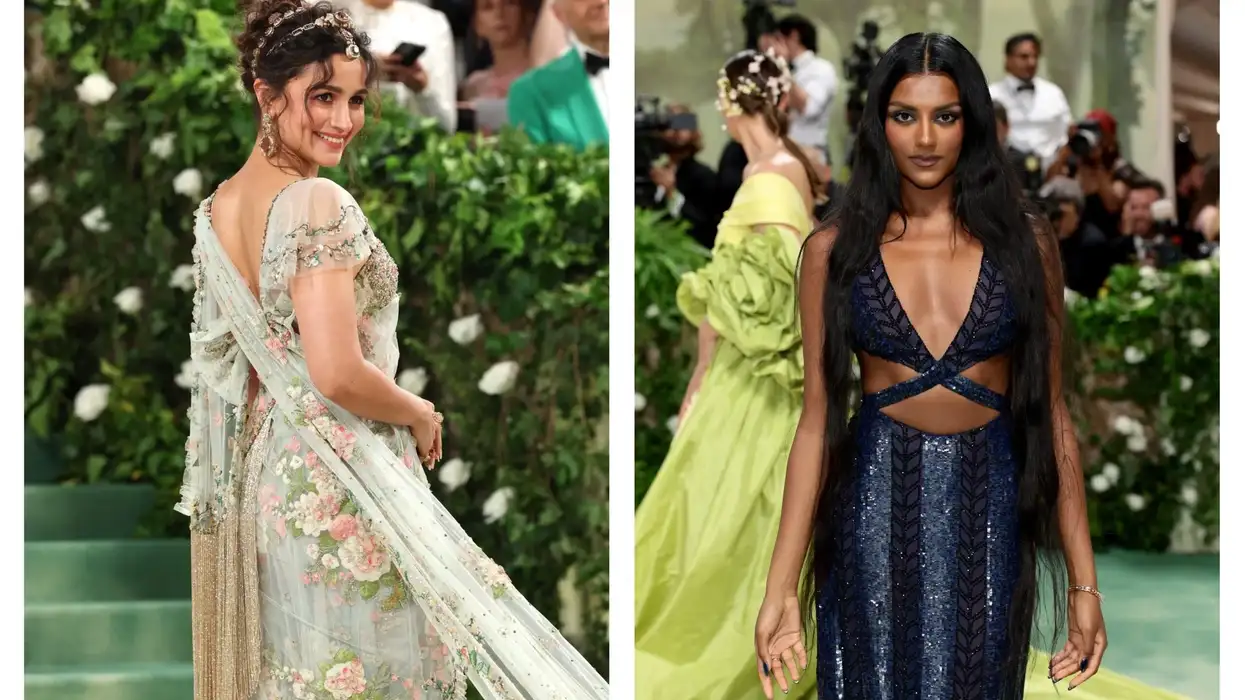The Met Gala has always been a pinnacle of glamour, creativity, and cultural significance in the world of fashion. This year, it was even more dazzling as several South Asian women graced the red carpet, showcasing their unique style and heritage with poise and elegance. Among the divas who stole the show were Alia Bhatt, Mindy Kaling, Simone Ashley, Isha Ambani, Natasha Poonawalla, Ambika Mod, Mona Patel, and Sudha Reddy.
Alia Bhatt: The Bollywood sensation captivated onlookers with her sartorial choice that seamlessly blended traditional Indian elements with contemporary flair. Dressed in a stunning mint green saree by Sabyasachi Mukherjee, Bhatt exuded confidence and grace as she navigated the gala, representing the fusion of East and West.
Mindy Kaling: The multifaceted talent known for her acting, writing, and producing prowess, turned heads in a statement-making sculpted nude couture gown that arched over her head, creating a stunning silhouette. It also featured a sweetheart neckline which was enhanced with subtle silver accents and sparkles. The ensemble was designed by Indian designer Gaurav Gupta.
Simone Ashley: The breakout star of Netflix's hit series Bridgerton made a striking appearance at the Met Gala, exuding sophistication and glamour. Dressed in a stunning cutout navy blue gown by Prabal Gurung, Ashley radiated confidence and beauty, cementing her status as a rising fashion icon.
Isha Ambani: The heiress to one of India's most prominent business empires dazzled on the red carpet in a show-stopping floral gown from the shelves of Rahul Mishra. The gown, which features delicately embroidered signature motifs of flowers, butterflies, and dragonflies, took around 10,000 hours to complete. It epitomized luxury and extravagance.
Natasha Poonawalla: The philanthropist and style maven made a bold statement with her avant-garde custom Margiela dress designed by John Galliano. Known for her fearless approach to style, Poonawalla showcased her impeccable taste and creativity, solidifying her reputation as a fashion trailblazer.
Ambika Mod: The acclaimed actress, who featured in the hit Netflix series, One Day, showcased her impeccable sense of style at the Met Gala, turning heads with her effortlessly chic look in a monochrome black and white gown from Loewe. The white silk gown was a spectacle in itself and looked stunning on the actress.
Mona Patel: Indian entrepreneur and philanthropist based in the US brought her signature blend of sophistication and empowerment to the Met Gala red carpet. She made her much anticipated Met Gala debut in an off-shoulder gown by Iris Van Herpen. Patel epitomized the modern South Asian woman breaking barriers and making her mark on the world.
Sudha Reddy: Indian business tycoon and billionaire Sudha Reddy, who serves as a director at the MEIL Group, made a stylish return after her captivating debut at the Met Gala in 2021, where she donned a sophisticated custom-designed outfit by Falguni Shane Peacock. This time around she rocked a bespoke Tarun Tahiliani couture piece that looked absolutely stunning on her. While her ensemble garnered immense attention, it was her 180-carat diamond necklace, dubbed “Amore Eterno,” that truly captivated onlookers. Fashioned with elegance and symbolism, the statement neckpiece comprises a 25-carat heart-shaped diamond at its center, accompanied by three additional 20-carat heart-shaped diamonds, each representing Sudha Reddy’s husband and their two children.
Huma Abedin: Huma Abedin made a rare public appearance as she arrived on the red carpet at the 2024 Met Gala. A former aide of Hillary Clinton, Abedin chose a vibrant green Erdem gown embellished with jewelled bugs.
Radhika Jones: Vanity Fair editor-in-chief Radhika Jones was also present at the gala, dressed in a pastel embellished Gurung gown.




